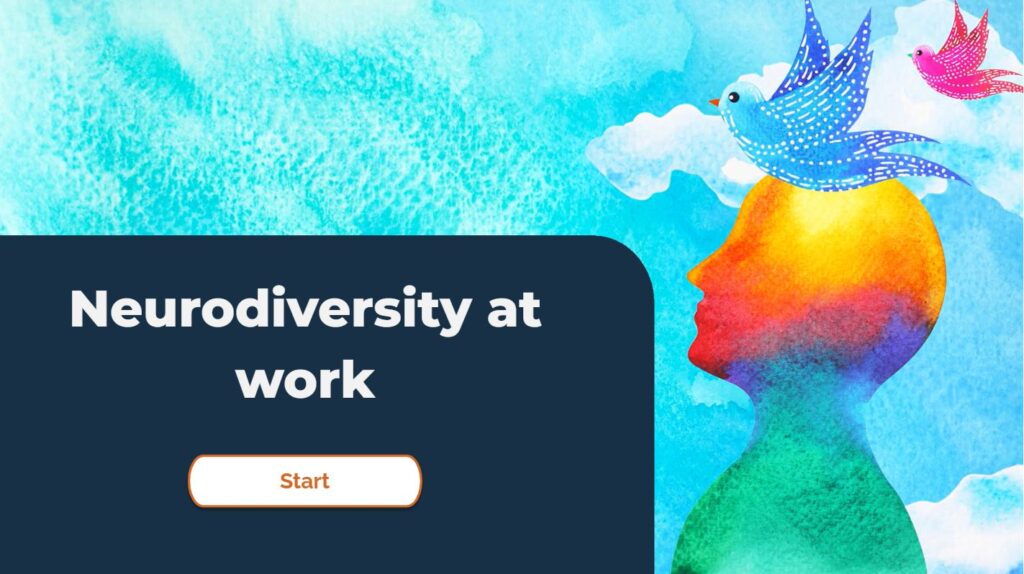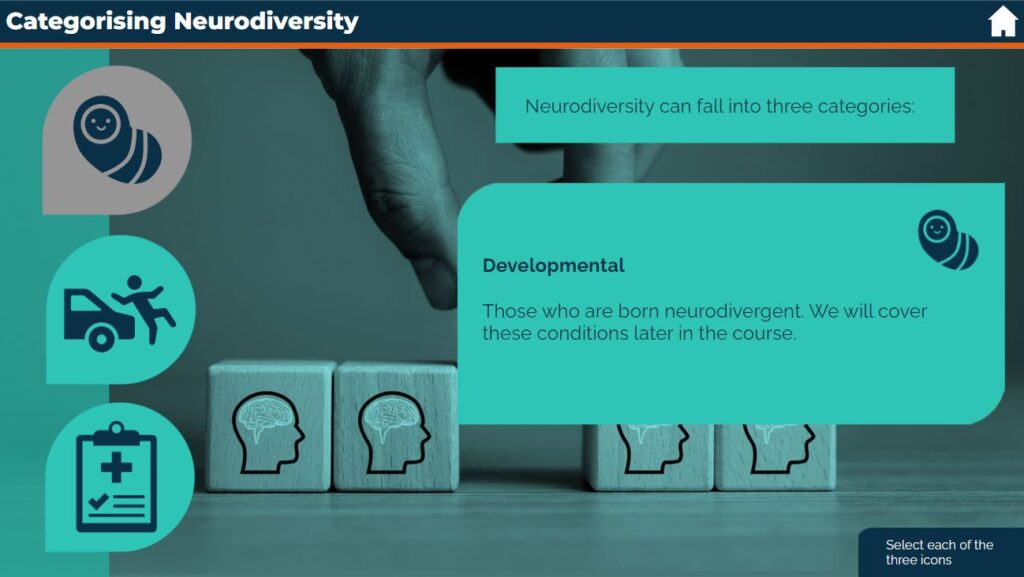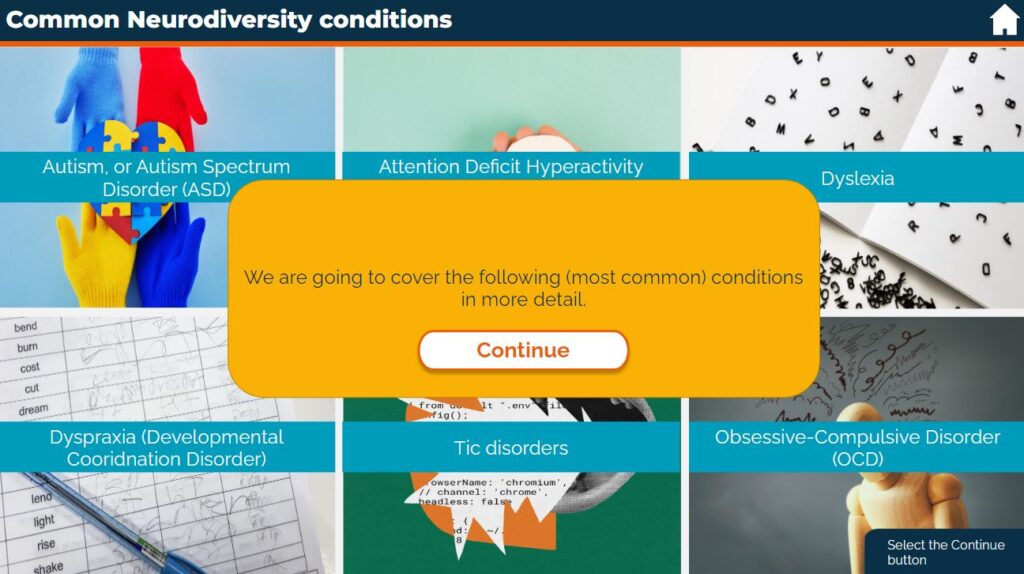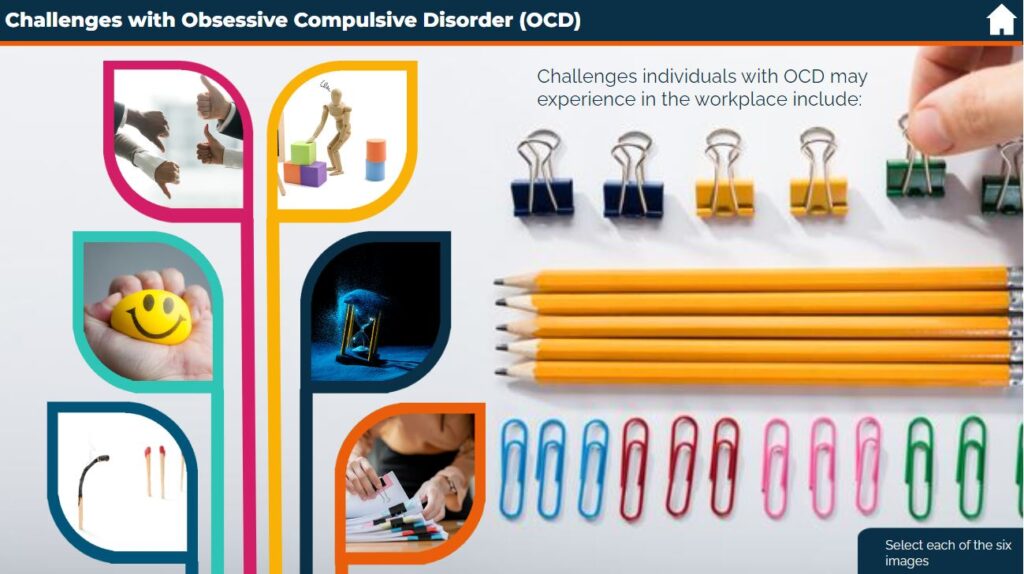Workplace Neurodiversity Training
Neurodiversity Training helps organisations to build an inclusive, supportive environment for neurodivergent employees.
Participants will gain a deep understanding of the workplace barriers that can hinder the success of those with common neurodiversity conditions and what reasonable adjustments can be implemented to help overcome these barriers.
The course highlights the strengths that neurodivergent employees bring to the workplace. Recognising and nurturing these strengths fosters a culture of inclusivity and empowerment which benefits individuals and drives an organisation’s productivity and growth.
Want to find out more information on our ‘Workplace Neurodiversity’ training course?

Workplace Neurodiversity eLearning Course
Neurodiversity Training helps organisations to build an inclusive, supportive environment for neurodivergent employees.
£25
Complete the form below to discuss multi-licence discounts with our team.

What are the benefits of Neurodiversity training?
- Increases knowledge and understanding of neurodiversity in the workplace so all employees can thrive.
- Designed and created by health and safety consultants in partnership with those with neurodiversity.
- IOSH Approved, CPD Certified and SCORM Compliant training.
- Online course can be completed at the employee’s own pace.
- Interactive training to keep participants engaged throughout.
- Multiple choice quizzes so participants can check their understanding as they go.
- Summaries at the end of each section to enhance understanding.
- No previous knowledge required.
Who should take this course?
All employees and managers can benefit from neurodiversity training. Training raises awareness of how neurodiverse individuals can be effectively supported in the workplace, so their strengths are fully utilised and they thrive.
Course duration
Neurodiversity training takes approximately 30 minutes to complete.
Course accreditations
Our accreditations mean you can be confident that we deliver high-quality, effective eLearning that forms part of a professional development programme.
We pride ourselves on our extensive certification and accreditation. We’re CPD Certified and this course is SCORM compliant which means it can be integrated as part of your existing LMS or used as part of our SHINE learning management system.
Learn more about our health and safety accreditations.
Neurodiversity FAQs
Why is neurodiversity training important if we don’t have many neurodivergent employees?
You may not be aware of all neurodivergent individuals in your workplace, as not everyone discloses their condition. Additionally, neurodiversity training benefits all employees by fostering a more inclusive environment, encouraging collaboration, and helping everyone understand different perspectives.
How can I ensure the training will lead to real changes in our workplace?
The course not only raises awareness but provides practical strategies for making reasonable adjustments and creating a supportive environment. By implementing these strategies, your organisation can nurture the strengths of neurodiverse employees and drive productivity.
What kind of support can I expect if I encounter issues with the course?
We offer full technical support to ensure a smooth experience, whether you’re using our SHINE platform or integrating the course into your LMS. Additionally, our customer support team is available to answer any questions related to course content or compliance.
What happens if someone fails the course assessment?
Participants who don’t pass the assessment on their first attempt can review the course material and retake the assessment. The course is designed to support learning, with interactive elements and quizzes to reinforce understanding throughout.
Can this course be customised to include our company’s specific policies on neurodiversity and inclusion?
Yes, we can tailor the course content to reflect your organisation’s policies, ensuring that the training aligns with your company’s goals and inclusivity practices.
Is this training only for managers, or should all employees participate?
This training is designed for all employees, as everyone in the workplace benefits from understanding neurodiversity. It helps foster a culture of inclusivity and ensures that neurodivergent individuals feel valued and supported at all levels.
Is there a discount if I need to train a large team?
Yes, we offer volume discounts for businesses that need to train multiple employees. Please contact us to discuss your requirements, and we can provide pricing based on your team size.
How quickly can this training be rolled out to my team?
Once purchased, the course can be accessed immediately through our SHINE platform or integrated into your existing LMS, allowing employees to begin training right away.
Can I monitor employee progress throughout the training?
Yes, if using the SHINE platform, you can track employees’ progress, view completion rates, and download certificates for compliance records.
Start your learning adventure
Created by experts. IOSH Approved. CPD Certified. Our fire, health and safety courses support your compliance training needs. We offer flexible eLearning options. Buy individual courses now and start learning. Or simply call us to discuss group discounts and enterprise pricing options.
Buy now – individual course
- Fully interactive – online learning
- Certified training – created by experts
- Perfect for smaller businesses and sole traders starting out
Call us – volume discount
- Save money – volume discounts
- Control – central dashboard
- Reporting – monitor training progress
- Ideal for mid-sized SMEs needing to deploy training at scale
Call us – Enterprise pricing
- Bespoke – tailored to your needs
- Comprehensive – over 50 courses
- Support – 1-2-1 account management
- Perfect for larger businesses needing a wide variety of training

Course aims
By the end of neurodiversity awareness training participants will:
- Have an increased awareness of a range of neurodiverse conditions and their unique strengths and challenges.
- Be able to provide guidance on creating an inclusive workplace that accommodates the needs of neurodiverse employees.
- Understand the unique strengths and contributions neurodiverse individuals bring to the workplace.
Course Overview
1. Introduction to neurodiversity
What is neurodiversity? Developmental and acquired conditions and how conditions are diagnosed.
Addressing common misconceptions about neurodiversity.
2. Neurodiverse conditions
Exploring attention deficit hyperactivity disorder (ADHD), autistic spectrum disorder (ASD), developmental language disorder (DLD), dyscalculia, dyslexia, dyspraxia, intellectual disability (ID), motor tics, obsessive compulsive disorder (OCD).
3. Neurodiversity in the workplace
Strengths, challenges and effective management of ADHD, ASD, dyslexia, dyspraxia, tic disorders and OCD in the workplace.
4. Legal and ethical considerations
Employer’s legal responsibilities: Equality Act 2010, reasonable adjustments, data protection, recruitment and selection, discrimination, and harassment.
5. Managing needs and challenges at work
How neurodiverse individuals can manage the needs and challenges of their condition at work.
Examples of reasonable adjustments an employer could make, remembering that everybody is different. Why it is essential to promote neurodiversity awareness to ensure everyone is valued in the workplace.
Why it is essential to promote neurodiversity awareness to ensure everyone is valued in the workplace.
6. Communication
Ways to communicate effectively with neurodiverse people who have challenges with communication, considering a person’s communication preferences and aspects such as the timing of the conversation, overstimulation, anxiety levels, the meanings of words and phrases and more.
Assessment
At the end of the Workplace Neurodiversity course, there are 10 multiple choice questions to answer, and the pass mark is 80%.
Certificate
If you complete the course on SHINE, you will receive a certificate which is downloadable as a PDF file.
Course screenshots
Fully interactive. Clear and simple. Created by experts.



How is it delivered?
Neurodiversity awareness training is delivered online or through a computer network to each trainee at their desktop, laptop or mobile device.
We can also provide the course to be integrated into a SCORM compliant LMS.
Training can be completed at the employee’s own pace by “bookmarking” and recording progress and returning to the training later.
SHINE – compliance record keeping
The Praxis42 Digital Platform SHINE is our advanced eLearning management system and helps organisations deliver effective online learning for their employees.
A cost-effective tool for compliance record-keeping, SHINE allows you to view and manage employee training records easily. Individual training certificates can be printed as proof of compliance for audits or visits from enforcing agencies.
Related courses
Explore similar courses from our library.

What our clients say
From national pub chains to global insurance, our clients value our expertise and service.
Workplace Neurodiversity Training – Download course information




